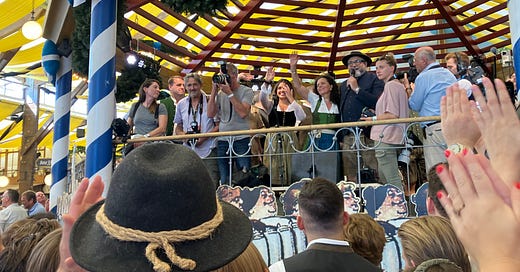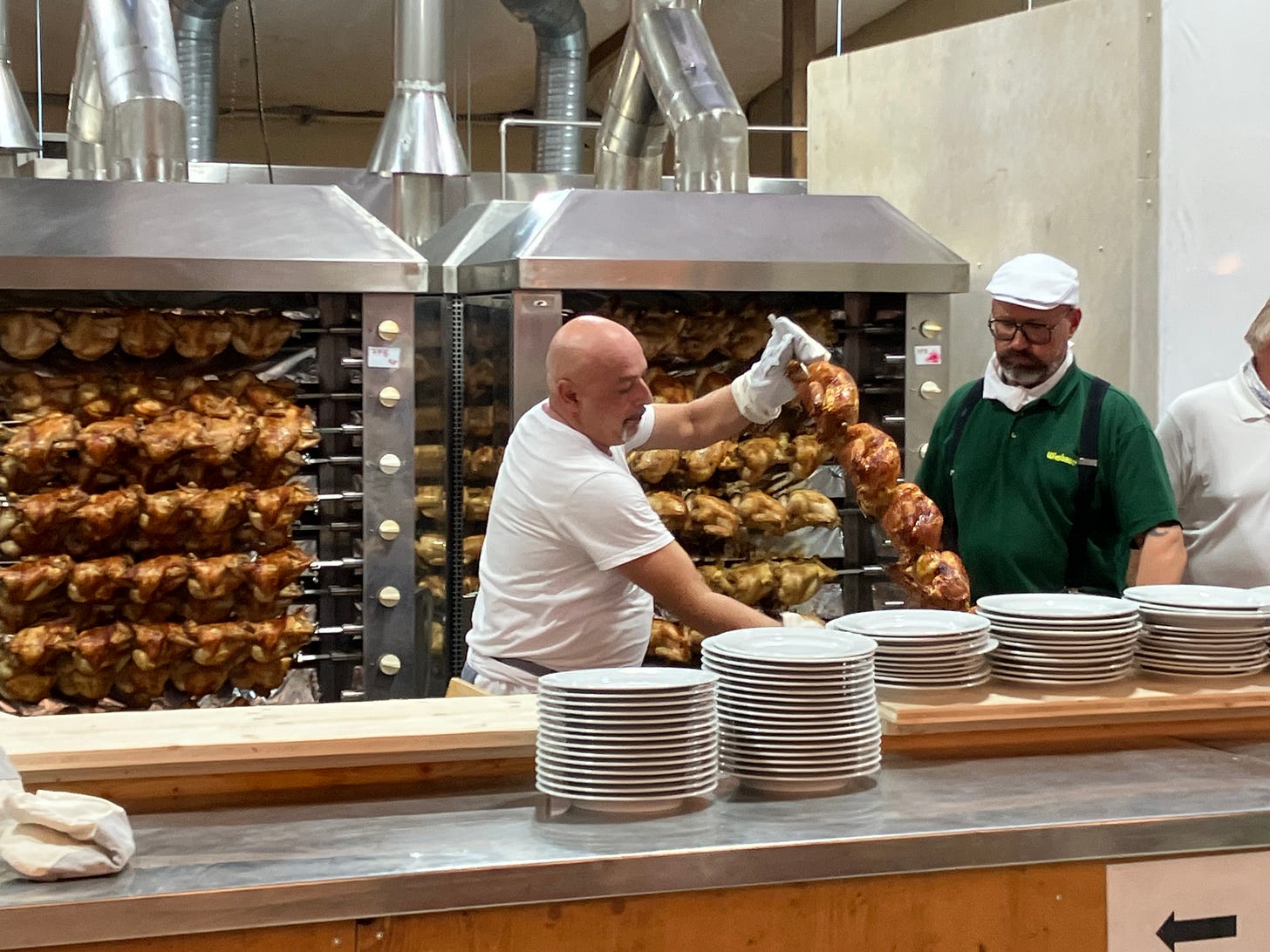How Organic Can Oktoberfest Go?
Oktoberfest is usually all about the beer. This year, there’s some drama about the chicken.
As I wrote this week in The Wall Street Journal, the decision by the Paulaner festival tent to serve all-organic hens at its marquee venue is stoking a debate between advocates of a sustainable Oktoberfest against traditionalists wary of a “Woke Wiesn”—a play on the short form of the name of the Bavarian celebration.
“It’s an experiment,” said Arabella Schörghuber, who runs the Paulaner Festzelt. “It’s more expensive, but the quality is higher. We want to make sure that the animal has a good life. We’ll see what happens.”
On Saturday, she helped hand out the first beers from the middle of the giant festival tent after thousands of people counted down to the tapping of the first keg. Waiters each toting a dozen glasses with a liter of beer wove through the crowds as huge rotisserie ovens cooked hens in a side kitchen, five on each spit.
It took a year of tinkering with the cooking process to make the switch to all organic. Schörghuber, a vegetarian, told me in an interview that she grew up spending time on farms and with animals, and that the switch was important for her. She was able to find a farm in Austria that raised the necessary birds and could deliver them at scale. Consumers, though, faced a €20.50 price — compared to €12.50 at a nearby stand for non-organic chicken.
The menu shift follows a pressure campaign by a coalition of groups, demanding that the Bavarian festival of hearty food and enormous beers should turn into a vehicle promoting organic farming. They displayed mockups of bloody chicken heads on Maienplatz, the central square, and said a change is needed if Munich wants to meet its goal of being climate neutral by 2035.
Activists pushed the city to adopt an organic mandate, but all they got was a roundtable this spring and a rejection.
“I don’t think anyone really wants a planned economy in which a small group decides what is good for the people and what is not,” said Thomas Geppert, head of the Bavarian Hotel and Restaurant Association.
There are 15 large tents on the Thersienwiesn, the grounds west of the old city center where Oktoberfest has been held since 1810. Schorghüber said she got a mixed reaction from the other innkeepers, as they’re known, but was happy to take a big step toward sustainability that was feasible.
The festival already uses electricity generated from renewable sources and single-use dishes and utensils are banned, according to Clemens Baumgärtner, the city official who overseas the festival and a member of the conservative CSU.
The big tents have committed to becoming climate-neutral by 2028, mostly through projects that offset their energy use. Four tents, including the Paulaner venue, already meet the targets and built systems to recycle some wastewater.
Around 500,000 chickens were consumed at the Wiesn in 2019, according to city stats, and more than 7 million liters of beer. Munich has one organic brewery, but it doesn’t have a coveted slot at Oktoberfest. And experts say it would be next to impossible to produce enough organic malt and hops needed to meet the scale of the demand.
Activist Susanne Kiehl said her group was happy with the Paulaner tent’s chicken change, but acknowledged how difficult it would be to convince the public that the brewers should be forced to tweak their recipes.
“That’s not an easy point in Munich,” she said. “That’s almost like religion.”
THE QUESTION: The first Oktoberfest was held to celebrate a royal wedding in 1810. Who got married?
Know the answer? Drop me a line at jimmy.vielkind@gmail.com. Or just write with thoughts, feedback or to say hi.
THE LAST ANSWER: The highest smoking rate recorded in a European country in 2019 was in Bulgaria. Almost 29% of people said they were daily smokers, according to an EU survey.




